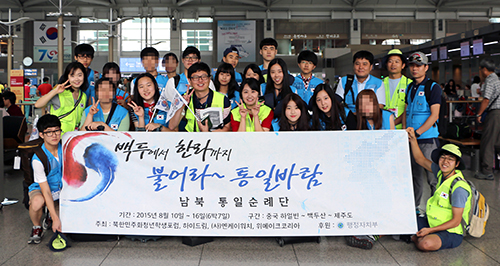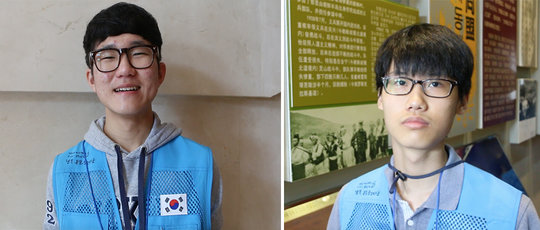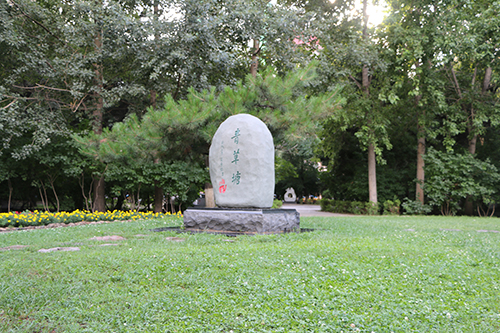 Students from the South and North pose for a photo at Incheon Airport before leaving for China on a ‘unification pilgrimage.” Image: Daily NK |
“It’s been 70 years since the South and North were separated, so I do believe there are certain differences, but I don’t think they are insurmountable. I think it’s important to recognize what those differences are and be willing to communicate. I believe that thought itself is enough to bring the two sides closer.”
When asked what she thinks of unification, this is what Kim Yu Na (Hanyoung Foreign Language High School) told your correspondent, who recently set out with a group of students on a one-week ‘unification pilgrimage.’
 Member Kim Yu Na from the group. Image: Daily NK |
Yu Na, who also took part in the trip, is a
reporter for a teen newspaper called ‘Wave’ that works to promote human rights
for North Korean defectors. She said she came to learn about the importance of
human rights through a students club and has since gained more interest in
North Korea and issues related to unification.
“I get to indirectly experience the culture
of North Korea through a school friend who escaped the North,” she explained.
By taking part in the trip, Yu Na said she would like to realize a ‘small
unification’ within the group that includes many defector students by reducing
the rift between the South and North.
The ‘unification pilgrimage’ was a project
sponsored by the Ministry of the Interior and jointly headed by four groups:
Two for One, NK Watch, We Make Korea, and Hi-Dream. The trip was planned with
the goal to provide teenagers with proper values and the foundation to become
future leaders for unification.
The participants had the opportunity to
honor independence activists that fought for the country’s liberation from
Japan’s colonial rule seven decades ago and were also able to visit Mt. Baekdu,
which embodies the nation’s spirit, as well as the Tumen River that separates
the North from the rest of the world, witnessing the reality of living in a
divided country.
Carrying on the spirit of Ahn Jung Geun
On the first day, the group traveled to
Zhaolin Park, where a memorial stone for independence fighter Ahn Jung Geun, is
located. The park itself was erected to celebrate China’s General Li Zhaolin,
who fought against Japanese colonialists. The calligraphy on the stone
‘cheongchodang’ was written by Ahn while he was in prison in Lushun, China,
after assassinating Japan’s former Resident-General to Korea Ito Hirobumi.
Ahn had left a will asking to be buried at
Zhaolin Park while Korea is still under colonial rule. The park in that sense
represents his determination to avenge his country.
 Members Lee Ju Yeong (left), Joo Ha Seong (right). Image: Daily NK |
In the presence of Ahn’s spirit in this
foreign land, the teenage members were solemn. Lee Ju Yeong particularly spent
a lot of time staring at the memorial stone.
“The reason why I’m here is because of our
ancestors,” he said. “I’m very moved to be able to see traces that Ahn left
behind after only having learned about him in textbooks.”
Another member Joo Ha Seong also shared his
thoughts, saying that he would have fought for independence had he been born
during the colonial rule. “I’m going to live each day to its best to make sure
their sacrifice was not in vain,” he added.
The defectors taking part in the trip said
they did not learn about independence activists who fought against the
Japanese. Being so focused on the idolization of the ruling Kim family, North
Korea does not allow any education on other figures outside of the Kims.
The state does create songs and movies
about Ahn to step up anti-Japanese sentiment and fire up patriotism, but
students do not learn about the significance of Ahn’s work and legacy,
according to defectors.
“We didn’t have time to learn about Ahn
Jung Geun in school,” Kim Eun Il, who escaped from the North, said. “We had to
work a lot to get by, and the teachers never taught us properly.”
“I will work hard to guard the Korean
Peninsula that our ancestors fought to protect and I hope to contribute to
Korea’s unification as a young defector in the future,” Eun Il added.


















